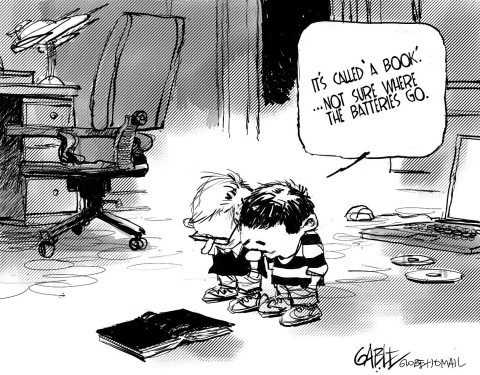University can often be a formative time in one’s life and can continue to have an impact on alumi long after they have graduated; such is the case with successful Globe and Mail cartoonist and University of Saskatchewan graduate Brian Gable.
Gable will be visiting the U of S from Oct. 22-24 and giving two guest lectures on campus, as well as receiving an Honorary Doctor of Letters from the university, which is an honorary degree and the most prestigious honour that a university can grant to someone.
Gable’s first talk on Oct. 22 is titled “Political Cartooning and the Great War,” and will be held at 7:30 p.m. at the Neatby-Timlin Theatre. Gable will also be presenting “The Future of Satire” on Friday, Oct. 23, which details his journey as a cartoonist and where the profession is headed. This event takes place at 12 p.m. in the Gordon Snelgrove Gallery on campus.
Employed as an editorial cartoonist at the Globe and Mail since 1987, Gable began his career at the Sheaf while still a student at the U of S.
“I was sitting in an English class and the person sitting beside me was writing for the Sheaf — this was early in the year of my second year of university, and he said, ‘I think I heard the paper’s looking for someone who can do cartoons,’ and he was looking at my notebook because I was scribbling away in my notebook, drawing instead of taking notes,” Gable said.
Aspiring journalists and illustrators at the U of S may find inspiration in Gable’s artistic journey. Gable stayed with the Sheaf for three years, contributing a number of cartoons for publication, which is  indicative of the experience students may gain within their own campus community.
indicative of the experience students may gain within their own campus community.
After graduating from the U of S, Gable moved to Ontario where he began teaching art. It was not long, however, before he started freelancing as a cartoonist for his local newspaper. This lead to jobs at the Regina Leader-Post in 1980 and later at the Globe and Mail.
Gable is the recipient of six National Newspaper Awards, which are awarded to exceptional Canadian journalists each year. He has also been published in the New York Times, the Guardian and Time Magazine, to name a few.
Working in a creative field, Gable enjoys the freedom that his job provides.
“I get to actually put my thoughts and personality into my work, and for me that’s the real pleasure of what I do. If I have an opinion about something that’s happening somewhere in the world, I can express it,” Gable said.
Journalism is a rapidly changing industry, and no one knows this better than Gable. In his lectures, he directly addresses how editorial cartooning has changed over time, from the First World War to the wake of events like the shootings at the French satirical magazine Charlie Hebdo.
“Satire is changing. Political humour is changing. The Internet has a profound effect upon how people are thinking about cartooning,” Gable said. “Where will political cartooning like I do it, and my fellow cartoonists do it, where is that going to be in 15 or 20 years? I’ve no answer. We don’t know. It’s possible that the single panel kind of joke cartoon about politics may no longer be a [medium] that people practice.”
Yet, the tradition of satirical cartooning appears to be carrying on. For Jeremy Britz, a third-year fine arts student and the graphics editor at the Sheaf, Gable proves that artists can become successful after studying at the U of S.
“I think it’s great that he has roots at the U of S. The U of S isn’t generally known for it’s art program so it goes to show that regardless of where you came from, you still have the ability to influence change on a larger scale,” Britz said.
Despite an uncertain future, the U of S and the Sheaf will hopefully continue to produce critical, thoughtful journalists and artists for years to come, Britz among them.
“Working at the Sheaf has forced me to open my mind to a broad spectrum of social issues that I may have overlooked in the past,” Britz said. “My hopes for the future are not so different than my current ambitions: create visually stimulating art that forces the viewer to think differently about social issues or life in general.”
—
Comic supplied by Brian Gable